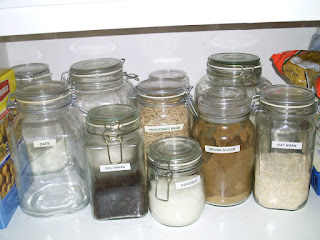It is easy to understand how it happens. We buy more than we need, and it goes off before we use it. We cook it up and then, because we have no plan for using the rest, it sits in the back of the fridge until it becomes a 'science experiment" and then we throw it out.
Throwing away food is a way of throwing away money, so curbing waste is a good idea if you want to do something more exciting with your funds or just pay the rates or whatever!
Food takes efforts to grow, and fertiliser, water and transport -and that all adds up to a big hit on the environment. If we can curb our waste, we can help the planet at the same time.

This month many of us in WA will commemorate "Sustainable September", an annual festival of all things which go to making our world last longer. My theme for this week is 'reducing waste" in the kitchen.

This is what I do:
1. Plan meals ahead so I know what I need to buy. I have added some measure of planning for our lunches as well as our evening meals. Our lunches are often the leftovers from a recent evening meal. If I put these leftovers in small containers, it is easy for DH and I to grab one as we leave for work. Hey presto! Nutritious for us and cheap too. DH told me this morning that he has not bought his lunch at all for the last 3 weeks. If he spent $13 on each lunch (easy to do in Perth -we are an expensive city!) then that is awhopping $195 we didn''t spend on those!
2. Try to establish a routine of shopping once a week. In the past we used to shop quite frequently -whenever we noticed something was 'low'. I have found if we shop only once a week, we are encouraged to be creative with our meal choices. No celery-maybe we could substitute the ribs of a silverbeet leaf instead? No fresh fruit? There are stewed apples in the freezer.
3. Freeze leftovers. One of the biggest problems with freezing leftovers is not knowing what the unidentified bits of stuff are, there lurking in the freezer. I have found that masking tape or painter's tape is good at low termperatures, and I can write on it in pencil. I have a roll which I keep near the kitchen, and any time I want to quickly label something I just snip off a small piece. It sticks to freezer bags or pyrex containers.
4. Freeze things likely to spoil before we use them. This goes for the bread I make -one small loaf is enough for a whole week sometimes, but other times it goes faster. No-one really likes week old bread, so I slice it up after it is made and put half in the freezer.
5. Store food carefully. I prefer glass containers where possible -with tight fitting lids. I put extra bread flour in the fridge as I have had it spoiled by weevils. My "simple living" friends say it would be better in the freezer, but I don't have room in my freezer so it lives in the fridge. So far so good! I did have some success for a while storing bulk rice -but the weevils found it in the end, so now I prefer to keep stocks low, until I can be assured that I can keep it without spoiling. I find that a tight fitting lid on a container in the fridge can keep may vegetables crisp for quite a long time.




1 comment:
I use canning jars for my rice (or other dry goods) and vaccuum seal them with my food saver; store them with an old dark towel covering the jars-keeps dust off and light out. Can reuse jars and lids after washing. No weevles without air! Plus, the jars can be stored just about anywhere!
Post a Comment